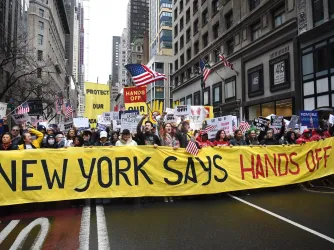Table of Contents
FIRE to Supreme Court: Only you can protect free speech online.

Joe Ravi / Wikipedia.org
Government interference with new speech technologies is nothing new, but freedom of speech online has come increasingly under threat in recent years. On Dec. 6, 2023, FIRE filed an amicus curiae — “friend of the court” — brief in the NetChoice cases seeking to defend free speech for social media platforms. FIRE’s brief explains that the First Amendment protects the right of all private publishers, from printing press operators to Instagram, to selectively edit, curate, and publish content free from government intrusion.
Internet freedom under threat: Texas and Florida regulate social media platforms
This case consolidates two different appeals involving NetChoice, an industry trade group for social media platforms and other internet companies. In 2021, convinced that large social media companies were making content moderation decisions biased against conservatives and Republicans, Florida and Texas decided to even the score. They passed laws that placed content moderation decisions under state supervision. Texas law prohibits large social media platforms from engaging in viewpoint-based moderation of users’ posts (such as deleting political posts perceived as right-wing), and Florida law bars the removal or “deplatforming” of certain users, including political figures. Both laws require platforms to explain and justify to the state their decisions to remove content or users.
The U.S. Court of Appeals for the Eleventh Circuit blocked the deplatforming and justification provisions of the Florida law because it viewed social media platforms as “a new and different medium for communication” to which “the basic principles of freedom of speech and the press” apply. But the U.S. Court of Appeals for the Fifth Circuit upheld similar provisions in the Texas law because, in its view, the Texas law bans “censorship,” not speech. The Supreme Court of the United States agreed to hear both appeals.
Texas and Florida chose to disregard the First Amendment to try to further political ends. FIRE’s brief asks the Supreme Court to intervene and guarantee the continued freedom of speech on the Internet for generations to come.
The Fifth Circuit was wrong and the Eleventh Circuit was right: As private actors, social media platforms have the First Amendment right to choose what is said on their sites and who gets to say it.
Editorial discretion is not censorship, and it is protected by the First Amendment
As FIRE’s brief explains, while “the printing press was ‘born free’ in the United States by virtue of the First Amendment,” throughout much of the twentieth century, the Supreme Court allowed governments to interfere with speech transmitted via “cinema, broadcast radio and television, and cable television, among other emerging media.” But over time, the Court came to recognize that, while each method of communication may differ in its particulars, the “basic principles of freedom of speech and the press, like the First Amendment’s command, do not vary. Those principles . . . make freedom of expression the rule.” The Court went on to recognize that the First Amendment protects various forms of media, including cinema, broadcasting, cable television, video games, and the internet.
Because social media platforms are private actors, they do not “censor” users when they choose what posts and accounts to delete or deprioritize. Instead, they engage in editorial decision-making, much like a newspaper engages in editing by selecting what “letters to the editor” to publish. And as the Court held in Miami Herald Publishing Company v. Tornillo and other cases, the First Amendment bans government “intrusion into the function of editors.” That is because the First Amendment protects Americans’ — and American companies’ — right to speak, whether they choose to say everything, something, or nothing at all.
Editorial discretion is speech, and calling it censorship does not make it so. As FIRE’s amicus brief points out, the Fifth Circuit’s “obsessive misuse of the term ‘censorship’” — 145 times, to be exact — “brings to mind Inigo Montoya’s immortal words from The Princess Bride: You keep using that word. I don’t think it means what you think it means.”
For similar reasons, forcing social media platforms to justify their editorial decisions in removing user posts or accounts also violates the First Amendment. FIRE’s brief put it best:
Any law authorizing state oversight of moderation decisions intrudes deeply into platforms’ editorial prerogatives. It does not matter whether platforms enforce their “own” policies. Imposing time limits on the review process and empowering government functionaries to assess the adequacy of platforms’ responses is a significant burden.
And that significant burden violates the First Amendment.
Texas and Florida chose to disregard the First Amendment to try to further political ends. FIRE’s brief asks the Supreme Court to intervene and guarantee the continued freedom of speech on the Internet for generations to come.
Recent Articles
Get the latest free speech news and analysis from FIRE.

He refused to censor his syllabus — so Texas Tech cancelled his class

Fandom’s lighthouse in a sea of censorship

FIRE statement on Stephen Colbert’s James Talarico interview and continued FCC pressure


